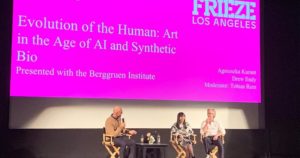Nathan Gardels is the editor-in-chief of Noema Magazine. He is also the co-founder of and a senior adviser to the Berggruen Institute.
“We are entering an age where we can build our own DNA from scratch. We will create a series of beings that are natural but do not exist in nature,” anthropologist Tobias Rees observed. “What then happens to the distinction between nature and technology when we enter post-human land?”
Yet, as the director of the Berggruen Institute’s Transformations of the Human program, which explores what it means to be human, continued, “All we have to address it are 19th century concepts. Maybe a more interesting thing to do will be to open to this unknown future and bring in artists and philosophers to help us rethink this future.”
The artist Agnieszka Kurant echoed this point: “Our current concepts are inadequate to deal with the disruptions we face. We have to create new models, vocabulary and tool kits to think about this with a new logic. We have to reconstruct our worldview from scratch.”
Drew Endy couldn’t agree more. “What are the implications for the future human,” he asked, when you can “combine biology wherever you can print DNA, decoupling from [genetic] lineage and disconnecting from location in time?” For this synthetic biologist, such advances present the “opportunity to consider a new operating system for culture — the connection of science and engineering with philosophy and art.”
Indeed, these leaps on the frontiers of science are reawakening the poetic, artistic, philosophical and even religious imagination since they raise anew foundational questions of origin and destiny that define the place of humans in the cosmos.
As Henry Kissinger (yes, that Kissinger) has perceptively posited, “The Enlightenment started with essentially philosophical insights spread by a new technology. Our period is moving in the opposite direction. It has generated a potentially dominating technology in search of a guiding philosophy.”
A few contemporary philosophers, like Peter Sloterdijk, have been pursuing that search for a new cultural operating system that situates being in the arriving era. Information in our era of networks and genome maps, according to Sloterdijk, binds humans and their tools that transform nature into one operative system. This “post-metaphysical” condition not only abolishes the separation between the subjective person and “objective spirit,” but the distinction between culture and nature as well.
Here is the way he put it in a 2014 article in “New Perspectives Quarterly”:
The fundamental differentiation of soul and thing, spirit and matter, subject and object, freedom and technique cannot cope with entities that are by their very constitution hybrids with a spiritual and material “component.”
Cybernetics, as the theory and practice of intelligent machines, and modern biology, as the study of system-environment-units, have forced the questions of the old metaphysical divisions to be posed anew.
Here, the concept of objective spirit turns into the principle of information. Information enters between thoughts and things as a third value, between the pole of reflection and the pole of the thing, between spirit and matter. Intelligent machines — like all artifices that are culturally created — eventually also compel the recognition of “spirit.” Reflection or thought is infused into matter and remains there ready to be re-found and further cultivated. Machines and artifices are thus memories or reflections turned objective.
“In such a reconceptualization,” the German philosopher argues, “the constellation of ‘I’ and ‘world’ loses much of its luster, not to mention the worn-out polarity of individual and society. But above all, the metaphysical distinction between nature and culture withers. This is because both sides of the distinction are only regional states of information and its processing.”
For Sloterdijk, this information ecology gives humans a new fused identity with each other, with their world and their tools. Humans are no longer an identity apart. He calls this co-intelligent system “anthropo-technology.”
Some poets have sought to contemplate a new culture that combines science and the arts when humans and technology are conjoined. In a conversation some years ago, Czeslaw Milosz expressed his concern over the divorce of “hard” science from what was walled off as “the humanities.” “Maybe we will all realize we’ve been on the wrong train,” the Nobel poet mused. “Goethe had the intuition that something was going wrong, that science should not be separated from poetry, the mindful reverence for being. Blake also. Maybe we are going to return to a very rich era where poetry is once again alongside science.”
Some big questions arise. Where does being reside in this new constellation? On what basis should it be revered, and how?
All these thinkers are on the right path: When the haiku meets the double helix, we will find a new language to speak about the future we have already entered.





